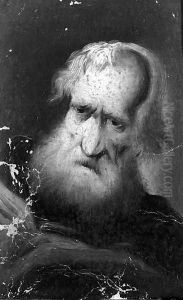Christian Wilhelm Dietrich, Called Dietricy Paintings
Christian Wilhelm Ernst Dietrich, better known as Dietricy, was a distinguished German painter and etcher born on October 30, 1712, in Weimar, Germany. He was a pivotal figure in the art scene of the 18th century, renowned for his versatility and ability to emulate various styles, particularly those of the Dutch and Flemish masters. Dietricy's oeuvre encompasses a wide array of subjects, including landscapes, religious and mythological scenes, as well as genre and still-life compositions, showcasing his adept skill in both painting and printmaking.
Dietricy's artistic journey began under the tutelage of his father, Johann Georg Dietrich, a court painter and art inspector in Weimar. This early exposure to art and the artistic environment of the court played a significant role in shaping his career. In 1731, he furthered his studies at the Dresden Academy, where he was profoundly influenced by the works of Rembrandt, whose style he often sought to replicate and reinterpret in his own creations.
In 1741, Dietricy embarked on a pivotal journey to Italy, where he immersed himself in the study of Italian masters, refining his technique and broadening his artistic horizon. Upon his return to Dresden in 1743, he was appointed court painter by August III, Elector of Saxony and King of Poland, a position that solidified his status as a leading artist of his time. During his tenure as court painter, Dietricy produced a significant body of work that was celebrated for its elegance, richness of detail, and the harmonious blending of Italianate light with Northern European sensibilities.
Throughout his career, Dietricy's work was characterized by a remarkable adaptability and an innovative approach to composition and technique. His landscapes, often imbued with a poetic and atmospheric quality, were particularly admired for their dynamic execution and the subtle interplay of light and shadow. His historical and biblical scenes, on the other hand, displayed a keen understanding of human emotion and narrative depth, attributes that made his work resonate with contemporary audiences.
Dietricy's influence extended beyond his lifetime, as his paintings and prints continued to be studied and admired by subsequent generations of artists. His ability to synthesize various artistic traditions into a cohesive and distinctive style has earned him a place among the most important German artists of the 18th century. Christian Wilhelm Ernst Dietrich passed away on April 23, 1774, in Dresden, leaving behind a legacy that has contributed significantly to the development of German art history.
